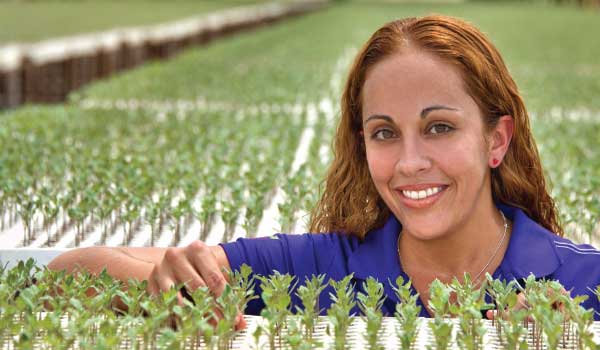
Varieties of Success via Distance
When Jasmine Lopez was small, she played in the soil, barefoot. The feel of earth on the soles of her feet brought her joy.
That was years before she knew about the microscopic materials in the soil or the infinitesimal genetic blueprints that determined the form and flavor of the plants growing in it.
“I like being in the field. It’s my therapy,” Lopez says.
As she grew up, moving at age 9 from Methuen, Massachussetts, to San Sebastian, Puerto Rico, Lopez (MS ’14 plant breeding) kept her delight in the outdoors. The climate of her surroundings may have changed, but her appreciation of the earth and its produce did not.
She received her bachelor’s in agronomy from the University of Puerto Rico Mayaguez Campus in 2001. She put her expanding knowledge to work as a chrysanthemum grower for Syngenta in Fort Myers, Florida, in 2007. And she moved to the position of an assistant sweet corn breeder in 2010.
Plant breeders view their vocation, which involves identifying and reproducing desirable traits in plants to meet consumer and producer needs, as key to feeding a growing world population.
“Part of the future increase in food production must come from improved varieties that are developed by plant breeders,” says Walter Fehr, Distinguished Professor of Agriculture and Life Sciences. “As a result, there will continue to be a strong demand in the future for young people who are well-trained in the discipline.”
Lopez’s career was coming into focus, moving from technical work into the more specialized world of plant breeding. She needed more education and training. A mother of two elementary-aged children with a full-time job, she sought out an online degree.
She started looking for a good online master’s program, and ultimately decided on Iowa State’s Master of Science in Plant Breeding online option, which was brand new at the time. In August of 2011, she started her master’s degree.
“An online program was the only option I had due to the advantage of doing a master’s program after a work day and without sacrificing much of family time – or so I thought,” Lopez says.
Lopez found what many online students find – that an online education is convenient in many ways, but it is a time commitment. Complex courses such as Molecular Plant Breeding and Quantitative Genetics for Plant Breeding require commitment in the classroom and at a distance. Nevertheless, Lopez found a way to distinguish herself.
“Just having completed credits in my master’s in plant breeding landed me with a higher job opportunity at Lipman in 2012,” Lopez says. Lopez started at Lipman Produce as a product advancement specialist. Lipman is the largest field tomato grower in the United States.
Two years later, in August of 2014, Lopez became the first graduate of the M.S. in Plant Breeding online program. Her dedication to understanding and applying the material in her courses inspired her peers as well as her professors.
Walter Fehr says Lopez was “in many ways the ideal student.” Fehr was most impressed with how she integrated her training at Lipman into her studies.
“It was obvious from the discussions I had with her and the other students I taught online that she was actively interacting with the breeders in her company,” Fehr says. Mark Barineau, the director of breeding at Lipman, also observed Lopez’s sincere engagement with her education and her work.
“I was pleasantly surprised to see that she was able to effectively work with me in the field and lab doing many of the selection and evaluation tasks almost from the start,” Barineau says. “So gaining the basic education enabled her to integrate rapidly into the daily breeding level operations of the tomato program.”
Lopez says being a part of feeding people motivates her as she continues to move her career forward. But food is not only about sustenance. Plant breeding, in its efforts to feed the world, also requires creativity and consideration for consumers’ tastes.
Different companies breed for different reasons, Lopez says. Some companies breed for big production numbers. Lipman’s research team breeds for a multitude of desirable traits that consumers could be looking for. Flavor, color and nutrients are all considered when creating new varieties. When Lopez speaks of the research and development team at Lipman, her voice is full of pride.
“A high percent of the product grown by Lipman is our research and development product,” she says. “That percentage is growing every year.”
That means the company is turning out new varieties of tomatoes at a fast clip.
As Lopez keeps proving herself as a young leader at Lipman, there is one question that needs to be asked: does she even like their signature crop? Thankfully, she does.
“I love tomatoes,” Lopez says.



